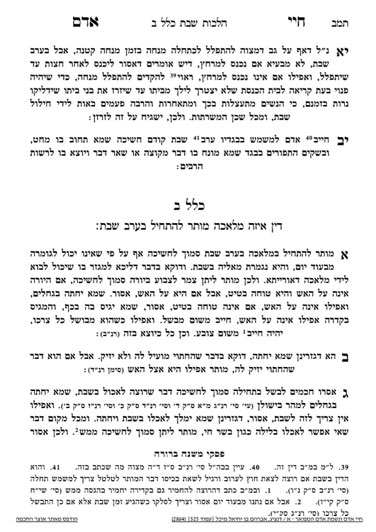We are continuing in siman 12, where the Chayei Adam discusses checking one’s garments to ensure they do not carry muktzah items or carry in an area without an eruv.
The Chayei Adam writes that a person should check their pockets samuch l’chasheicha, close to nightfall, kodem l’chasheicha, before nightfall. Based on this language, the Mishnah Berurah suggests that the Chayei Adam may be referring to two times, one earlier in the evening and another right before Shabbos.
One must check not only the garments they are currently wearing, but any garments they may wear over Shabbos. For example, if one plans to wear a coat at some point over Shabbos, or a woman plans to wear different items of clothing over Shabbos, one is chayav to check all of them.
The Shulchan Aruch Harav and Gra take this halacha a step further. If one puts an item in their pocket on Shabbos, they may end up with one of the issues we are discussing–that they will carry the item outside of the eruv. (We can assume that the other concern, placing a muktzah item in one’s pocket, is not relevant.) If so, the same way one must check their pockets before Shabbos, one must avoid placing items in their pockets over Shabbos. This is a chiddush of the Shulchan Aruch Harav and Gra. On the other hand, the sefer Tehilla LeDovid disagrees. He explains that the concern was for an item placed in a pocket earlier in the week which was forgotten about. If one places an item in their pocket over Shabbos, they will be aware of it and remove it.
Rav Shlomo Zalman paskens that if one lives near a large thoroughfare, where one would potentially be carrying in a reshus harabim deorasya, one should be machmir and follow the opinion of the Shulchan Aruch Harav and Gra. If a person lives in an area where the areas in question are derabanan (karmelis) one can rely on the opinion of the Tehilla LeDovid.
If one lives within an eruv, they do not need to be concerned; however, if the eruv is not up for Shabbos, they must be aware of these concerns.
There is a fascinating halachic discussion regarding what exactly a person transgresses when they inadvertently carry outside of an eruv. There are three parts to carrying; uprooting, transferring and putting down. Uprooting refers to when an item is in a state of rest and one moves it. This can be done both by actively moving the object, or by moving something which moves the object, such as a pair of pants with an item in a pocket. Transferring refers to transferring the item to another domain, and putting down the item refers to when the item returns to a state of rest. The Gemara says that when a person is carrying an item, if they stop to adjust themselves it is not considered as though they have put the item down, but when they stop with the intention to rest, it is considered as though they have put it down.
If so, the question is asked that, for example, if a person walks out of their house with an object inadvertently in their pocket, transfers domains, and then deliberately decides to stop somewhere to talk to a friend, there was no deliberate action on the part of the carrier in uprooting the item. If so, the alleged melacha is lacking in intent, and should not be a problem on a Torah level.
However, the Gra explains that the fact that people tend to put things in their pockets gives it the halachic status of awareness that it was there, so all three components of the melacha were done with intent, and it is considered carrying on a Torah level.
When we discuss the melacha of hotza’ah, we will discuss what to do when one realizes they are carrying something.
We have finished the first klal, and will begin the next klal, which discusses potential melacha issues, in the upcoming shiur, be’ezras Hashem.
Summary
- One must check their pockets, or possibly their entire garment, before Shabbos. The reason is to avoid carrying muktzah items, and to avoid carrying even non-muktzah items outside of an eruv.
- One must check all garments they may wear over Shabbos.
- Some are machmir not to place any items in their pockets over Shabbos, out of concern they may end up carrying the item. One should be machmir if they live near a reshus harabbim deoraysa, but can be meikil if the areas around them are a karmelis.
Pesach 5783
Click here to watch Rabbi Reingold performing a Model Seder.



